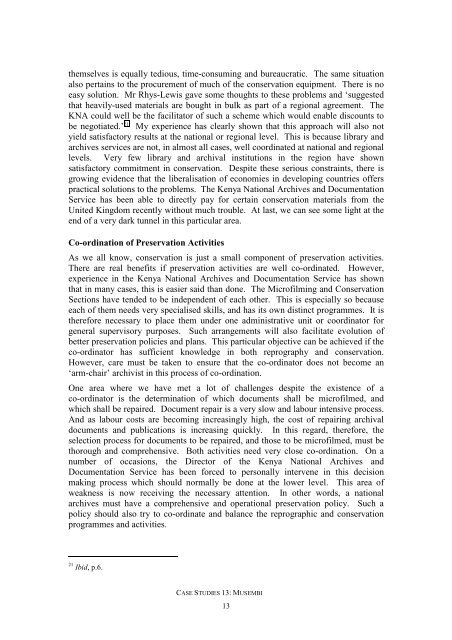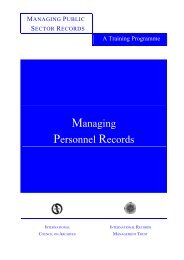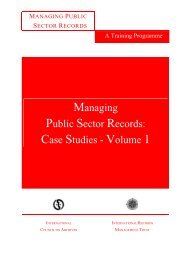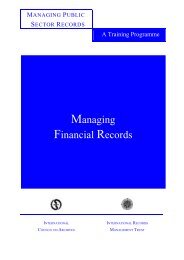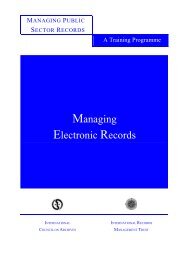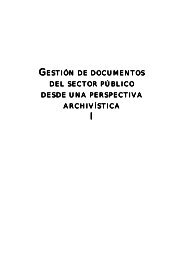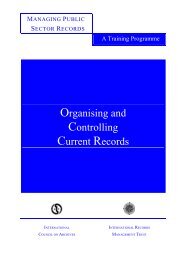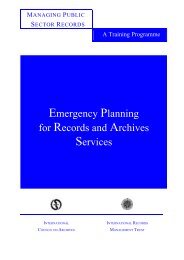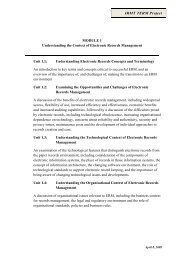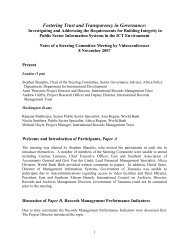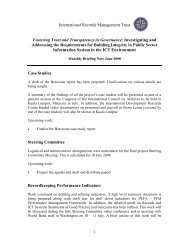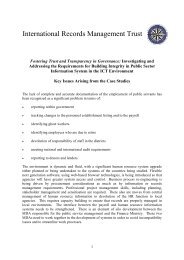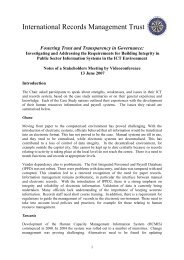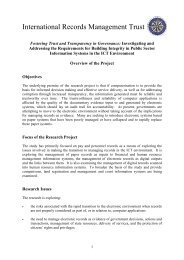managing public sector records: a study programme - International ...
managing public sector records: a study programme - International ...
managing public sector records: a study programme - International ...
Create successful ePaper yourself
Turn your PDF publications into a flip-book with our unique Google optimized e-Paper software.
themselves is equally tedious, time-consuming and bureaucratic. The same situation<br />
also pertains to the procurement of much of the conservation equipment. There is no<br />
easy solution. Mr Rhys-Lewis gave some thoughts to these problems and ‘suggested<br />
that heavily-used materials are bought in bulk as part of a regional agreement. The<br />
KNA could well be the facilitator of such a scheme which would enable discounts to<br />
be negotiated.’ 21 My experience has clearly shown that this approach will also not<br />
yield satisfactory results at the national or regional level. This is because library and<br />
archives services are not, in almost all cases, well coordinated at national and regional<br />
levels. Very few library and archival institutions in the region have shown<br />
satisfactory commitment in conservation. Despite these serious constraints, there is<br />
growing evidence that the liberalisation of economies in developing countries offers<br />
practical solutions to the problems. The Kenya National Archives and Documentation<br />
Service has been able to directly pay for certain conservation materials from the<br />
United Kingdom recently without much trouble. At last, we can see some light at the<br />
end of a very dark tunnel in this particular area.<br />
Co-ordination of Preservation Activities<br />
As we all know, conservation is just a small component of preservation activities.<br />
There are real benefits if preservation activities are well co-ordinated. However,<br />
experience in the Kenya National Archives and Documentation Service has shown<br />
that in many cases, this is easier said than done. The Microfilming and Conservation<br />
Sections have tended to be independent of each other. This is especially so because<br />
each of them needs very specialised skills, and has its own distinct <strong>programme</strong>s. It is<br />
therefore necessary to place them under one administrative unit or coordinator for<br />
general supervisory purposes. Such arrangements will also facilitate evolution of<br />
better preservation policies and plans. This particular objective can be achieved if the<br />
co-ordinator has sufficient knowledge in both reprography and conservation.<br />
However, care must be taken to ensure that the co-ordinator does not become an<br />
‘arm-chair’ archivist in this process of co-ordination.<br />
One area where we have met a lot of challenges despite the existence of a<br />
co-ordinator is the determination of which documents shall be microfilmed, and<br />
which shall be repaired. Document repair is a very slow and labour intensive process.<br />
And as labour costs are becoming increasingly high, the cost of repairing archival<br />
documents and <strong>public</strong>ations is increasing quickly. In this regard, therefore, the<br />
selection process for documents to be repaired, and those to be microfilmed, must be<br />
thorough and comprehensive. Both activities need very close co-ordination. On a<br />
number of occasions, the Director of the Kenya National Archives and<br />
Documentation Service has been forced to personally intervene in this decision<br />
making process which should normally be done at the lower level. This area of<br />
weakness is now receiving the necessary attention. In other words, a national<br />
archives must have a comprehensive and operational preservation policy. Such a<br />
policy should also try to co-ordinate and balance the reprographic and conservation<br />
<strong>programme</strong>s and activities.<br />
21 Ibid, p.6.<br />
CASE STUDIES 13: MUSEMBI<br />
13


